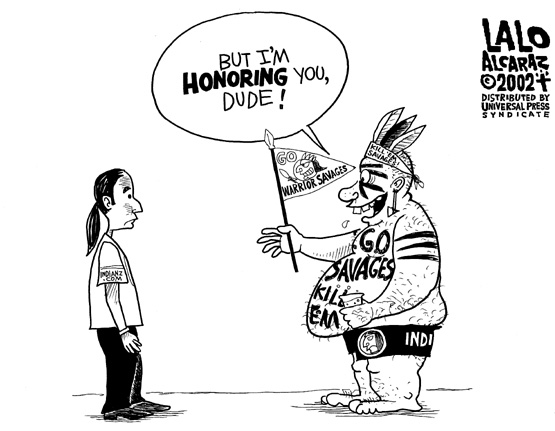The Bush administration appears on the list, compiled by the Thomas Jefferson Center for the Protection of Free Expression, for its efforts to discourage, modify and sometimes censor government scientists' reports and studies to be more in line with the administration's political policies, notably on global warming, the center said.
"What's problematic is that it differentiates based on acquiescence that can be obtained from some tribes and penalizes those that don't have identifiable tribes," O'Neil said.
1) The NCAA didn't censor anyone. It gave its members a choice: Remove offensive sports mascots and logos or don't participate in NCAA-sanctioned post-season tournaments. Or quit the NCAA altogether. A choice with alternatives is the opposite of a mandate without alternatives.
2) The NCAA originally sanctioned 18 universities including a couple that had tribal approval. It backpedaled under intense pressure from pundits, politicians, and organizations like the Muzzle people who denounced it for "censorship." And now the Muzzle people are using that intense pressure as an excuse to justify the award? Can you say "hypocritical"?
3) So what if the NCAA acquiesced in the case of universities that have tribal approval? That's what this issue is all about, bright boys. You don't use someone's name and image if they object; you use it only if they give permission. The tribes approved in a few cases, which means they're acting consistently with the principle I just stated. There's nothing "problematical" about that except the Muzzle people's inability to understand the problem.
If a school doesn't have a historical connection to a tribe, that's exactly the point. The school shouldn't be appropriating an identity that it has no right or reason to use. Indians are tired of being stereotyped as warriors, savages, and brutes by people who don't know them. They're tired of having their names sullied by headbanging hulks who enjoy hurting others (i.e., athletes).
4) Last year Michael Richards (and assorted rappers) infamously shouted "nigger." Mel Gibson said Jews rule the world. Sen. George Allen called an Indian American a "macaca." Rosie O'Donnell made "ching chong" comments about Asians. In fact, racists of every stripe exercised the First Amendment by hurling slurs and insults at minorities.
Countless advocacy organizations condemned these people; in some cases they launched petitions or boycotts against them. Newspaper editorials weighed in against them. Pundits attacked them. Late-night talk-show hosts mocked them.
These were all attempts to shame and pressure the speakers into conforming to society's norms. I.e., to compel the speakers to censor themselves. So why not give the award to any or all of these of these organizations, newspapers, and pundits? Pick a representative "censor," or give the award to society as a whole, for daring to take a stand against offensive speech.
Radio shock jock Don Imus was just suspended for two weeks for calling black women "nappy-headed hos." Can we assume that his radio station is an early contender for a 2007 Muzzle award? Why not, since the station's actions parallel the NCAA's? Imus didn't say these words on his own dime or time. He violated the workplace's rules and the rulemaker is making him pay for it.
All clear on the issues? Good. For more on the NCAA's decision--much more--see Why FSU's Seminoles Aren't Okay.


The fact a choice is offered does not equate to a lack of censorship. "Do what we say or leave" is just as much of a mandate as "do what we say". The only difference here is that the consequence (or choice, as you put it) is stated up front. The consequence serves to compel them to censor themselves...
ReplyDeleteRegarding awards for people slinging racial slurs...
The Muzzle Awards are for people who censor, not for people who don't censor themselves, so this comment doesn't make any sense.
I like the hypocrisy angle you brought up, and I feel it's a valid point. The NCAA has been "censored" regarding their censorship.
Metacensorship: censoring censorship.
Your first point might have some validity if we were talking about society as a whole. But we're talking about a membership organization where the organization has established rules and the members agreed to abide by them. The schools' situation is akin to that of employees who insult or talk in tongues to customers in violation of the company's rules. Or who breach nondisclosure statements after signing them.
ReplyDelete"Censorship" normally doesn't apply in a work situation where an organization has a legitimate reason for establishing rules. True, an organization can't (or shouldn't be able to) squelch speech intended to help the public good (e.g., revealing a crime). But that's not the case in this case. There's no public benefit to promoting offensive Indian mascots.
In addition, there's no true compulsion here. If the schools refuse to play in a post-season tournament without their mascots, they face a minor loss of money and prestige, not some horrendous or fatal outcome. Pressure to obey the organization's rules and (more important) do the right thing is far from "censorship."
As you noted, the schools are doing the same thing to the NCAA that the NCAA did to them. They're threatening to sue the NCAA or persuade politicians to pass laws limiting the NCAA's jurisdiction. In other words, they're pressuring the NCAA not to speak in favor of banning mascots. So at best the Muzzle people should've given awards to both sides.
Your second point is valid. I'll change the writeup to reflect what I should've said.